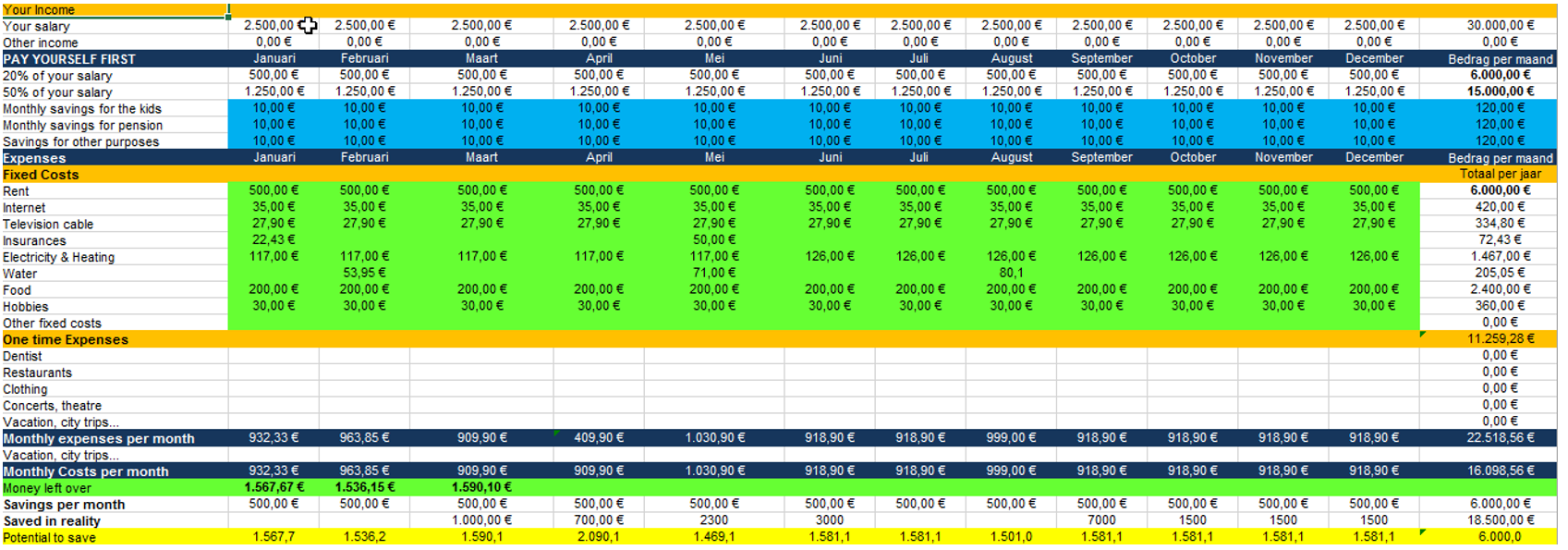Many people are afraid, are not interested, nor want to spend the time to manage their money. They rather prefer spend time on hobbies, spending money and are happy that they have enough money to cover their monthly expenses. They consider managing their money difficult and rather leave it up to the bank to store safely their savings. In order to get your financial situation under control, you need to learn some efficient basic habits.
I personally use one Excel spreadsheet to get one simple overview on my income and expenses. You can also do this on paper. In one eye overview I can manage my financial situation. See a screenshot below.
If you want to have this excel, contact me by email or social media. See a Screenshot below

Below I describe the 5 basic habits that you need to apply if you want to manage your money properly and become financially independent.
# 1. Pay YOURSELF first rule
Some people start to exercise sports when they feel too fat or not fit. The start of a good condition and health is to burn more calories than you eat. The start of a good financial health is to get and keep more money than you spend. Everything starts with how much you save or pay yourself first. But most people save what they have left at the end of the month. SO WRONG! Calculate your optimal saving amount per month, start with 20% of your salary and put it on a savings- or investment account automatically from the moment you receive your salary. Then spend the rest of the money. You will adjust your expenditure based on what you have left on your account. Each month you are able to manage to keep your 20% is a victory. Then look for opportunities to increase this 20% steadily by applying other habits below. Start as soon as possible. A good PAY YOURSELF FIRST habit is RULE 1 and the fundament for a financial health.
# 2. Expect Financial setbacks
Sooner or later you will have to face financial setbacks or unexpected expenses. Your car breaks down, you lose your job or even worse, you get severely sick in hospital for long time. Many things can happen that impact your financial health. Who hasn’t foreseen a buffer, can get into real big problems soon. Therefor a financial buffer on a savings account is rule number 2 to keep your financial health stable. Make sure you have saved a financial buffer of 6 to 18 months of your current salary which can cover your monthly expenses. In case you don’t have this financial buffer, make this your first priority before starting to invest and apply the other rules of my financial strategy.
# 3. Diversify your portfolio
It is impossible to time the market. Financial investments can move irrationally than most people think. It is important to invest in different markets and companies. A good spread of your investments ensures that positive elements on the long term will supersede the negative ones. This is a very old wisdom for all investors. Don’t panic when your investment turns red but see this potentially as an opportunity to buy extra as long as your investment gives your cash flow on your bank account. Learn the strategy and focus on cash flow instead of capital gains.
# 4. Low costs
Costs and expenses reduce your return on the short term but also your potential achievement for financial freedom on the long term. Everything you pay on expenses, cannot give you money in the future. Banks are a master in advising financial products with a cost of 1,5 to 6%, but they won’t tell you if you don’t ask the cost structure. If you pay for example 2% for a fund investment, it doesn’t seem a lot. But when you on average get a return of 8% per year, you are losing already 25% of your return. In addition you can save a lot of money in review all your expenses, your electricity bill, water, and many other expenses. Shop around and reduce your expenses by 10%. You can use that 10 % to increase your Pay yourself first amount.
# 5. Ask advice
You cannot invest in whatever as then you are gambling. It is important to ask advice to the right people. Ask yourself first if the person who give you advice, does so for a company profit or in YOUR best interest. I am not a financial advisor. I do a lot of reading of other people who are already financially independent and people who are on their path to financial freedom. With the right learning and some financial guidance, nothing prevents YOU from following the same path to financial freedom.
At last: do you know your net worth?
99% of the population does not know their net worth and this is essential to become financially independent. They do not care and are happy with what is left on the bank at the end of the month.


No Comment
You can post first response comment.